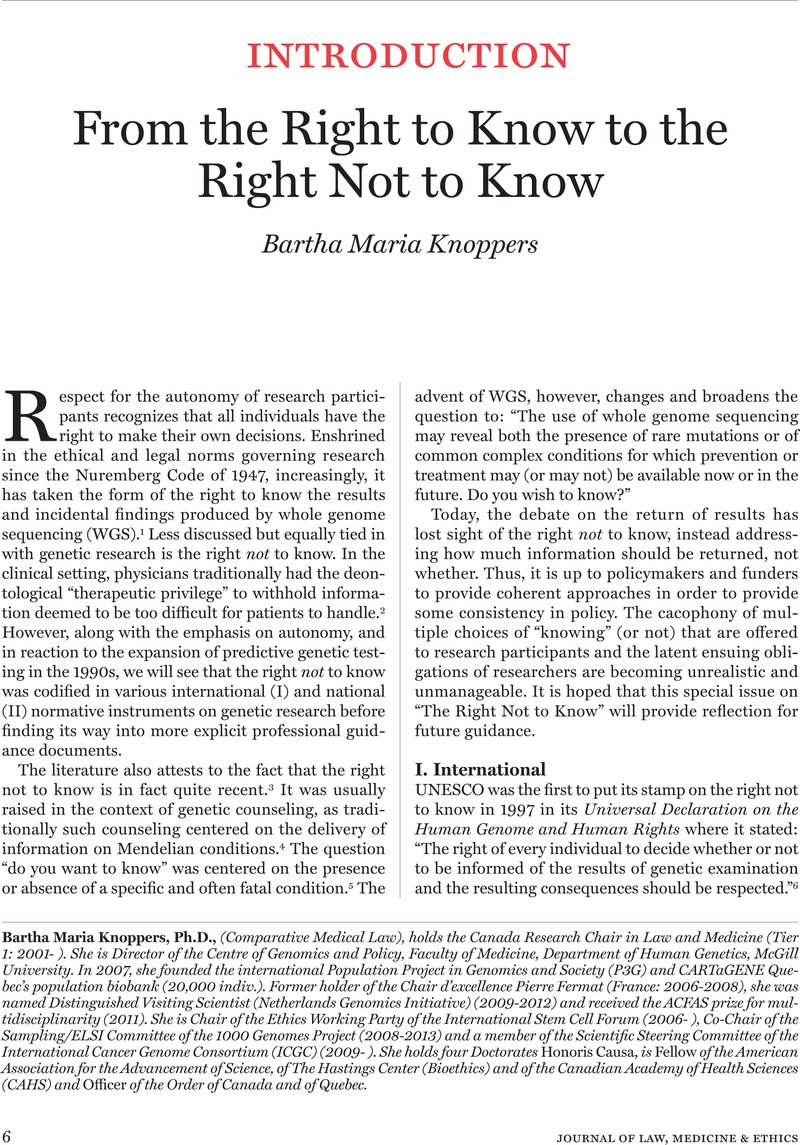Crossref Citations
This article has been cited by the following publications. This list is generated based on data provided by Crossref.
Daar, Judith
2015.
Distinctions in Disclosure: Mandated Informed Consent in Abortion and ART.
Journal of Law, Medicine & Ethics,
Vol. 43,
Issue. 2,
p.
255.
Pont‐Sunyer, Claustre
Bressman, Susan
Raymond, Deborah
Glickman, Amanda
Tolosa, Eduardo
and
Saunders‐Pullman, Rachel
2015.
Disclosure of research results in genetic studies of Parkinson's disease caused byLRRK2mutations.
Movement Disorders,
Vol. 30,
Issue. 7,
p.
904.
Knoppers, Bartha Maria
Nguyen, Minh Thu
Sénécal, Karine
Tassé, Anne Marie
and
Zawati, Ma’n H.
2016.
Next-Generation Sequencing and the Return of Results.
Cold Spring Harbor Perspectives in Medicine,
Vol. 6,
Issue. 10,
p.
a026724.
Hercher, Laura
Uhlmann, Wendy R.
Hoffman, Erin P.
Gustafson, Shanna
and
Chen, Kelly M.
2016.
Prenatal Testing for Adult‐Onset Conditions: the Position of the National Society of Genetic Counselors.
Journal of Genetic Counseling,
Vol. 25,
Issue. 6,
p.
1139.
Liddell, Kathleen
and
Skopek, Jeffrey M.
2017.
Informed Consent for Research Using Biospecimens, Genetic Information and Other Personal Data.
SSRN Electronic Journal ,
Vermeulen, Eric
Rebers, Susanne
Aaronson, Neil K.
Brandenburg, Alexander P.
van Leeuwen, Flora E.
and
Schmidt, Marjanka K.
2018.
Patients' Attitudes Towards the Return of Incidental Findings After Research with Residual Tissue: A Mixed Methods Study.
Genetic Testing and Molecular Biomarkers,
Vol. 22,
Issue. 3,
p.
178.
Baum, Ewa
and
Domaradzki, Jan
2018.
The Ethics of Reproductive Genetics.
Vol. 128,
Issue. ,
p.
189.
Bijlsma, R.M.
Wouters, R.H.P.
Wessels, H.
May, A.M.
Ausems, M.G.E.M.
Voest, E.E.
and
Bredenoord, A.L.
2018.
Managing unsolicited findings in genomics: A qualitative interview study with cancer patients.
Psycho-Oncology,
Vol. 27,
Issue. 4,
p.
1327.
Daar, Judith
Benward, Jean
Collins, Lee Rubin
Davis, Joseph B.
Davis, Owen
Francis, Leslie
Gates, Elena
Ginsburg, Elizabeth
Klipstein, Sigal
Koenig, Barbara
McCullough, Laurence
Paulson, Richard
Reindollar, Richard
Ryan, Ginny
Sauer, Mark
Tipton, Sean
Westphal, Lynn
and
Zweifel, Julianne
2018.
Disclosure of sex when incidentally revealed as part of preimplantation genetic testing (PGT): an Ethics Committee opinion.
Fertility and Sterility,
Vol. 110,
Issue. 4,
p.
625.
Morrissey, Clair
and
Walker, Rebecca L
2018.
The Ethics of General Population Preventive Genomic Sequencing: Rights and Social Justice.
The Journal of Medicine and Philosophy: A Forum for Bioethics and Philosophy of Medicine,
Vol. 43,
Issue. 1,
p.
22.
Liddell, Kathleen
and
Skopek, Jeffrey M
2018.
Encyclopedia of Life Sciences.
p.
1.
Ost, Suzanne
and
Gillespie, Alisdair A
2019.
To know or not to know: Should crimes regarding photographs of their child sexual abuse be disclosed to now-adult, unknowing victims?.
International Review of Victimology,
Vol. 25,
Issue. 2,
p.
223.
Palazzani, Laura
2019.
Innovation in Scientific Research and Emerging Technologies.
p.
37.
Krekora-Zając, Dorota
2019.
Legal aspects of biobanking HBS for scientific purposes in Poland.
Studia Prawnicze / The Legal Studies,
p.
165.
Saelaert, Marlies
Mertes, Heidi
Moerenhout, Tania
De Baere, Elfride
and
Devisch, Ignaas
2020.
Ethical values supporting the disclosure of incidental and secondary findings in clinical genomic testing: a qualitative study.
BMC Medical Ethics,
Vol. 21,
Issue. 1,
Davies, Ben
2020.
The right not to know and the obligation to know.
Journal of Medical Ethics,
Vol. 46,
Issue. 5,
p.
300.
Marchant, Gary
Barnes, Mark
Evans, James P.
LeRoy, Bonnie
and
Wolf, Susan M.
2020.
From Genetics to Genomics: Facing the Liability Implications in Clinical Care.
Journal of Law, Medicine & Ethics,
Vol. 48,
Issue. 1,
p.
11.
2021.
Ausculter la santé.
p.
427.
Robinson, Johanna Amalia
Novak, Rok
Kanduč, Tjaša
Maggos, Thomas
Pardali, Demetra
Stamatelopoulou, Asimina
Saraga, Dikaia
Vienneau, Danielle
Flückiger, Benjamin
Mikeš, Ondřej
Degrendele, Céline
Sáňka, Ondřej
García Dos Santos-Alves, Saul
Visave, Jaideep
Gotti, Alberto
Persico, Marco Giovanni
Chapizanis, Dimitris
Petridis, Ioannis
Karakitsios, Spyros
Sarigiannis, Dimosthenis A.
and
Kocman, David
2021.
User-Centred Design of a Final Results Report for Participants in Multi-Sensor Personal Air Pollution Exposure Monitoring Campaigns.
International Journal of Environmental Research and Public Health,
Vol. 18,
Issue. 23,
p.
12544.
Davies, Ben
and
Savulescu, Julian
2021.
The Right Not to Know: some Steps towards a Compromise.
Ethical Theory and Moral Practice,
Vol. 24,
Issue. 1,
p.
137.



